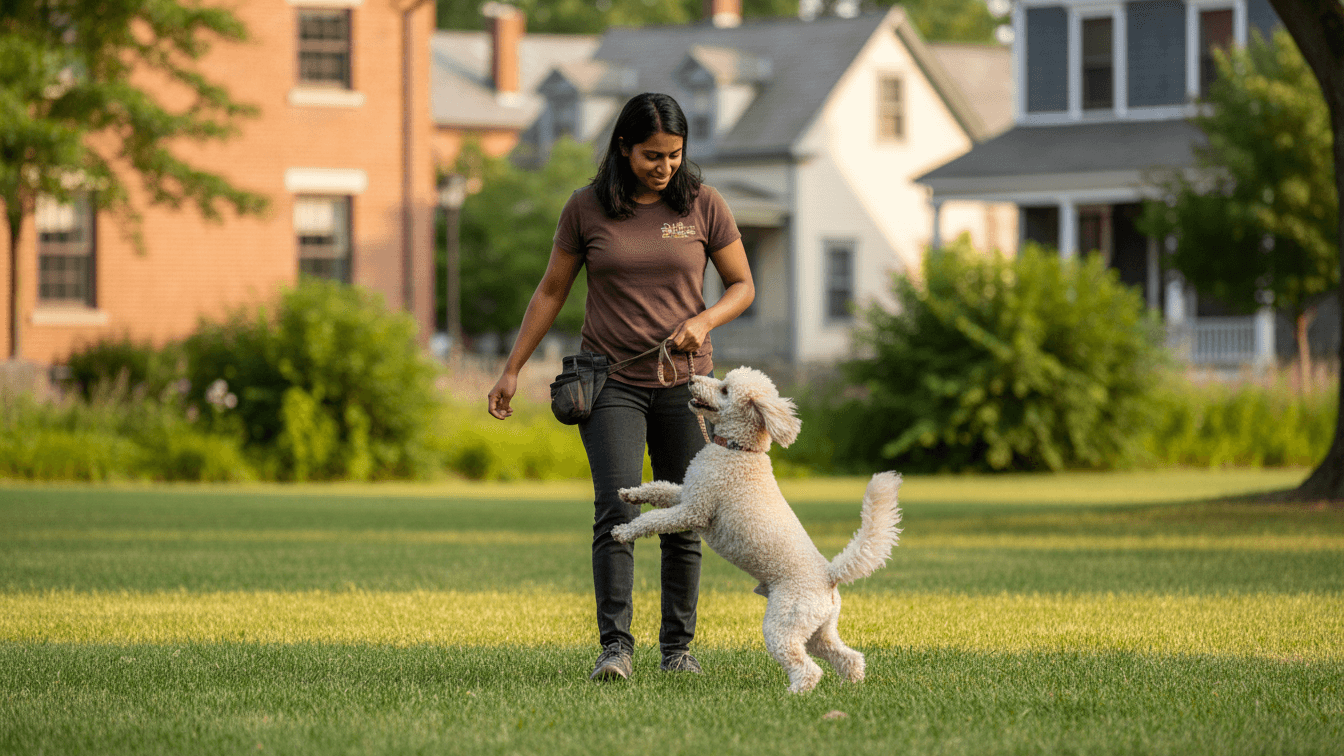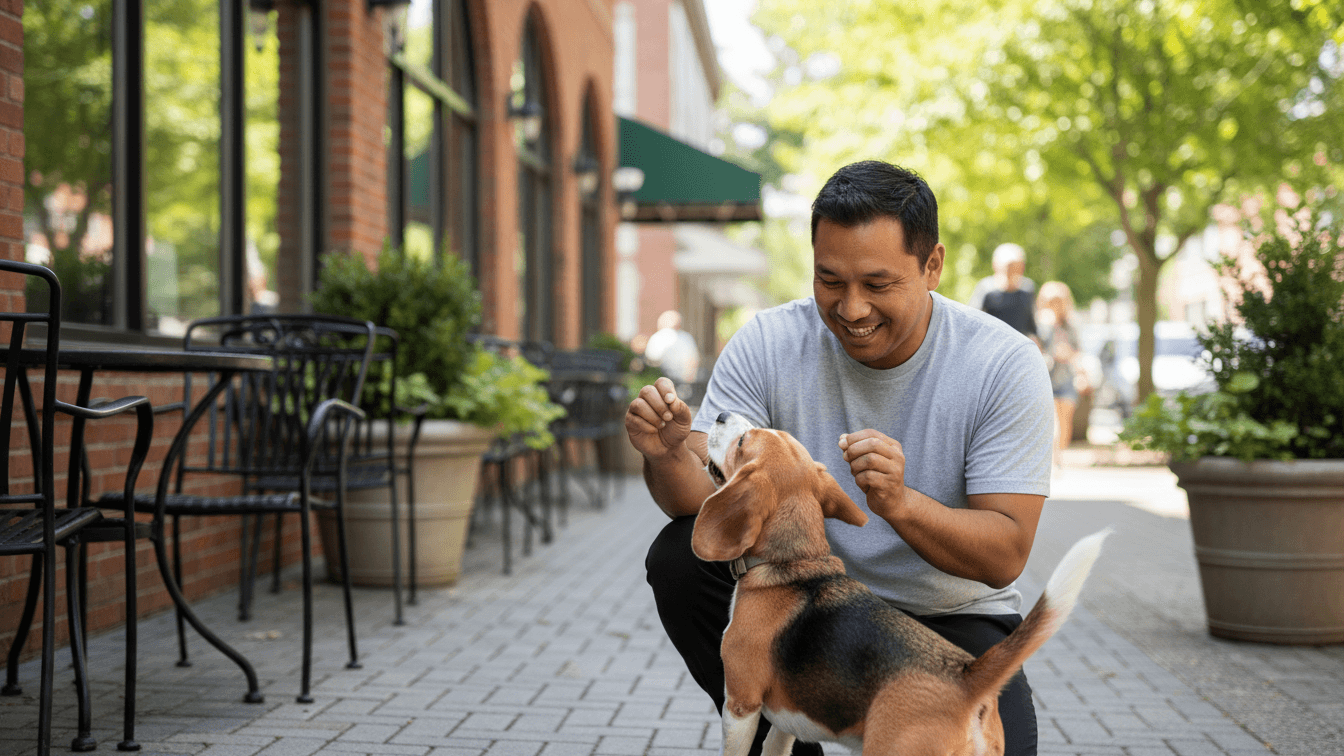Your Complete Guide to Choosing a Dog Trainer in Richmond, ME and Surrounding Areas
Living with a dog in Richmond means navigating rural roads, enjoying riverside trails along the Kennebec, and being part of a close-knit community where neighbors know each other. Your dog needs to handle quiet country roads, occasional encounters with wildlife, and the social atmosphere of local gatherings without pulling, jumping, or showing fear.
Since Richmond sits in Sagadahoc County, local rules follow both town ordinances and Maine state guidelines. When you find a trainer who understands rural Maine living, you’ll get better results at home and around town.
How to Choose the Right Trainer
Start by looking for someone who uses positive reinforcement training and can set realistic goals for your Richmond lifestyle. This means your dog should learn to walk calmly on quiet roads with minimal sidewalks, stay focused when deer or other wildlife appear, and handle trips to the vet or local shops without drama.
Credentials give you a quick way to compare trainers’ experience levels. Common dog trainer certifications include KPA-CTP, CPDT-KA, or IAABC-CDBC for behavior problems. If your dog has serious aggression issues, look for someone with CBCC-KA or a science-based program like CTC.
In-home dog training works great for puppy manners, door greetings, and neighborhood leash skills on Richmond’s rural roads. Group classes make sense once your dog can focus around other dogs, though you may need to travel to nearby communities for more options.
Common Dog Training Methods Explained

Reward-based methods build the trust you want while creating lasting behavior changes. They also help you follow Richmond’s rules about keeping dogs under control in public.
Basic obedience covers sit, down, stay, place, recall, and leash training so your dog can handle quiet walks, visits to local businesses, and encounters with neighbors without pulling or jumping on people.
Puppy training focuses on socialization, potty training, bite control, crate comfort, and early leash skills. Starting with short, positive sessions prevents bad habits from forming in the first place.
Behavior modification addresses fear, reactivity, resource guarding, or separation anxiety through careful desensitization and counterconditioning. For serious cases, ask if your trainer works with local veterinarians.
Private lessons and in-home sessions let you customize everything around your daily routines, while day training can speed up results when you’re short on time.
Group classes help your dog practice good manners around other dogs and people. The best classes give dogs plenty of space, screen participants carefully, and teach calm behavior rather than just excitement.
Specialized training like therapy dog training or service dog training requires extra structure, public-access skills, and a very clear step-by-step program.
Stay away from trainers who use fear, intimidation, or pain to get results. Humane methods are safer for everyone, easier to maintain long-term, and much better for keeping peace with your neighbors in a small town.
Average Cost of Dog Training in Richmond, ME and Surrounding Areas (Updated for 2025)
Prices around Richmond and Sagadahoc County depend on the trainer’s experience, how long training sessions last, and where the training happens. Many professional dog trainers serve multiple towns in the area, so prices reflect typical rates across the region.
| Service Type | Average Cost (Richmond/Sagadahoc County) |
|---|---|
| Puppy classes (4-6 weeks) | $140-$250 total |
| Group obedience training (4-6 weeks) | $150-$280 total |
| Private lessons (60-90 min) | $100-$175 per session |
| In-home coaching packages (4-6 visits) | $400-$850 total |
| Day training (trainer works your dog + handoff) | $425-$900 per week |
| Behavior consult for reactivity/anxiety (initial) | $140-$225 |
| Board and train (2-4 weeks) | $1,900-$4,200 total |
You’ll probably pay extra travel fees if you’re in a more remote part of town, and expect higher rates for complex behavior work with expert dog trainers.
Make sure you understand what’s included, how the trainer tracks progress, and whether they offer a free consultation before you sign up.
Questions to Ask a Potential Dog Trainer
- What training methods do you use, and how do you keep sessions positive and low-stress?
- What credentials do you have, like KPA-CTP or CPDT-KA? Do you keep up with continuing education such as CPDT-KSA?
- How will you customize the training program for my dog’s specific needs and our rural Maine lifestyle?
- Do you offer in-home visits, dog training classes, or day training, and which approach fits my goals best?
- How will we measure my dog’s progress and know when to add more distractions?
- What are the total costs, including any travel fees, and what’s your cancellation policy?
- Do you carry liability insurance, and can you show me proof?
- For behavior problems, will you work with my veterinarian if needed?
- What should I practice between our sessions to help my dog keep improving?
Local Richmond Rules and Considerations for Dog Owners
Richmond enforces leash laws and nuisance rules to keep public spaces and neighborhoods safe for everyone. Sagadahoc County follows Maine’s public health requirements too.
Leashes are required in all public spaces unless otherwise posted. Keep a standard 6-foot leash with you for walks around town and visits to local businesses.
Maine law requires current rabies vaccination for all dogs. You can get these through county clinics or your regular vet, and find more details through the Maine CDC.
Excessive barking can be considered a nuisance, so work with your trainer on alert barking and separation anxiety before neighbors start complaining. Richmond’s quieter setting means barking often carries farther than in busier areas.
Maine doesn’t require special licenses for dog trainers. If a business boards dogs for payment, the state’s Animal Welfare Program oversees kennel licensing through the Department of Agriculture, Conservation and Forestry.
The Town of Richmond manages local ordinances and can provide information about town-specific rules for dog owners.
Local Richmond Resources for Dog Owners and Surrounding Areas
These spots give you great places to practice polite manners, work on recalls, and provide safe enrichment for your dog. Always follow the posted rules and etiquette guidelines.
- Pleasant Pond Town Beach allows leashed dogs and offers open space for practicing calm behavior around families and other beachgoers during the off-season
- Swan Island State Wildlife Management Area welcomes leashed dogs on most trails, providing excellent opportunities to build focus around wildlife and water access
- Richmond Corner Saywood Community Forest offers trails where you can work on leash skills and recall in a quieter natural setting
- Dresden Dog Park, just across the town line, provides a fenced area for off-leash practice with clear posted rules

FAQs
How much does in-home dog training cost?
Most Richmond-area trainers charge $100-$175 per in-home visit, with discounts available when you buy packages. Behavior problems typically start at the higher end of that range.
Is in-home dog training worth it?
Absolutely, because you’re working on problems exactly where they happen. Your trainer can fix door manners, jumping on guests, counter-surfing, and reactivity right at home, then step outside to practice leash skills on your actual roads and driveways.
Can you pay someone to house train your dog?
Yes, many trainers offer puppy programs that include potty training, crate routines, and daily schedules. Day training can speed up the process while teaching you how to maintain the progress.
What is the 3-3-3 rule for dog training?
This is a helpful timeline for new or adopted dogs: expect about 3 days for your dog to decompress, 3 weeks to learn your routines, and 3 months to feel completely settled. Good training plans work with this natural adjustment period.
How long will it take to reach my training goals?
Most puppies and friendly adult dogs show solid progress within 4-8 weeks if you practice daily. Fear, reactivity, or aggression typically requires several months of careful behavior modification with gradual increases in difficulty.
What should I bring to group classes?
Pack a flat collar or harness, a 6-foot leash, high-value treats, water, and current vaccination records if your trainer requests them. Leave retractable leashes at home for safety reasons.
What’s the leash law in Richmond?
Dogs must be leashed and under control in all public areas unless in a designated off-leash zone. Keep that 6-foot leash handy for walks around town and visits to local businesses.
Do I need a dog license in Richmond or Sagadahoc County?
Yes, Richmond requires dog licenses for all dogs over six months old. You’ll need proof of current rabies vaccination to register. Contact the Town Clerk’s office for registration details and fees.
What shots does my dog need in Sagadahoc County or Maine?
Rabies vaccination is required throughout Maine for all dogs. Your veterinarian may also recommend distemper-parvo and bordetella based on your dog’s lifestyle and exposure to other dogs.
Are dog trainers required to be licensed in Richmond or Sagadahoc County or Maine?
No special trainer licenses exist in Maine. Trainers follow normal business regulations, but if they offer board and train services, their facility may need to be licensed as a boarding kennel under the state’s Animal Welfare Program regulations.
Where can I practice off-leash recall?
Use fenced dog parks like Dresden Dog Park across the town line to keep things safe and legal. Try visiting during quieter hours when you’re starting out.
Which dog parks allow training around Richmond and surrounding areas?
Dresden Dog Park just over the Richmond line offers a fenced area for off-leash practice. For additional options, you may need to travel to Brunswick or Augusta where more dedicated dog parks are available.
What beaches or trails allow dogs for training?
Pleasant Pond Town Beach allows leashed dogs and provides open space for socialization practice around people and families. Swan Island State Wildlife Management Area welcomes leashed dogs on trails, perfect for teaching calm focus around wildlife and water. Richmond Corner Saywood Community Forest offers trails where you can practice loose-leash walking and recall in a quieter natural setting.
How do I handle wildlife encounters during training?
Wildlife is common in rural Richmond, so teaching a reliable recall and focus command is essential. Work with your trainer on Leave It and Watch Me commands to help your dog stay calm when deer, turkeys, or other animals appear during walks.
What if my dog is reactive to farm animals?
Many Richmond properties have chickens, horses, or other livestock nearby. A certified dog trainer can help with behavior modification using gradual exposure and positive reinforcement training to teach your dog calm responses around farm animals.
The right combination of thoughtful planning, humane methods, and consistent practice around Richmond’s quiet roads and natural spaces will help your dog become a confident, well-behaved dog. If credentials matter to you, don’t hesitate to ask about dog trainer certifications and how your trainer stays current with new techniques. Many trainers also offer a free evaluation to discuss your specific needs and determine the best dog training services for your situation.
